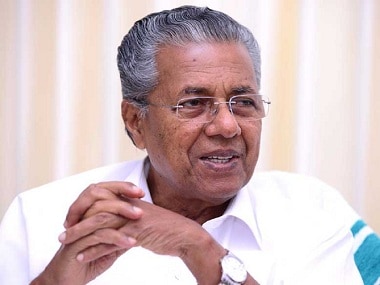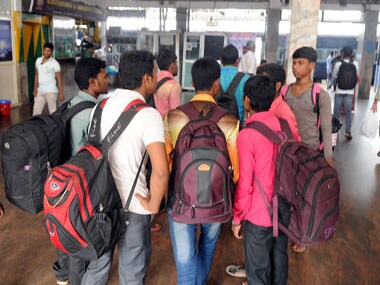Premature and unnatural deaths are common in tribal hamlets in the southern Indian state of Kerala but most of them go unnoticed and unreported.
But the death of a 30-year-old mentally ill tribal youth at Attappady in Palakkad district on 22 February has shaken the state. This is because of an unprecedented protest staged by the tribespeople against the brutal mob lynching of their fellow human being.

Madhu Chindaki was caught and tied up for allegedly stealing rice. He was later killed. Image courtesy News18
The tribals, who seldom raise their voice against atrocities committed against them, woke up from their slumber and paralysed normal life at Agali, the headquarters of Attappady block after the body of Madhu Chindaki was brought to the police station.
He was beaten to death by a group of people at Kadukumanna hamlet in Attappady after he was accused of stealing valuables from a house in the area. The youth, who has been living in a forest ever since he lost his mental balance ten years ago, used to come out to residential areas only to collect food to sustain his life, according to his mother, Malli.
Madhu had come out on Thursday in search of food. He had returned to the forest after collecting rice and some provisions from a grocery shop at Kadukummana. But the group followed him and questioned him about the theft at the house of a non-tribal. They later tied his hands with his lungi and attacked him with sticks.
The assailants then posted the video and pictures of the heinous attack in the social media and handed over the severely wounded youth to the Agali police. He collapsed and died in the police jeep while being taken to a hospital.
As soon as the news spread, people from various tribal hamlets came out of their homes and blocked the ambulance carrying his body to Thrissur Medical College Hospital for post-mortem demanding immediate arrest of the persons responsible for Madhu's death.
The protestors let the vehicle go only after two of the accused were taken into custody by the police. But the parents of the murdered youth along with his two sisters started an indefinite sit-in protest in front of Agali police station demanding the arrest of all the persons involved in the case.
The protest reverberated across the state with various groups taking to the streets against the mob lynching. Activists of Adivasi, Dalit and human rights groups took out marches in cities and towns across the state. The death also set the social media on fire with many questioning the brutal manner in which a mentally unstable man was killed.
Adivasi Gothra Maha Sabha leader Geethanandan has viewed the protests launched by the Adivasis at Agali as a positive development. He said that the members of the community have been facing attacks ever since settlers from other parts of the state started grabbing their land and livelihood in a big way a couple of decades ago but none protested.
"The Adivasis kept mum even when a spate of attacks was unleashed against them by settlers a decade ago. They silently suffered the atrocities committed against them as the settlers were powerful and they enjoyed the support of the powers-that-be. The present protest indicates a new awakening among them," Geethanandan told Firstpost.
He viewed this as a positive development and hoped that the Adivasis will continue their fight against the exploitation and injustice being meted out to them. However, prominent tribal leader CK Janu isn’t that optimistic.
She said there were not many Adivasis left in Attappady to fight. Adivasis constituted 90 percent of Attappady’s population in 1951. It declined to 34 percent by 2011. The fall in the population followed the influx of settlers from across Kerala and Tamil Nadu. She fears that the Adivasis will become extinct in Attappady if the current trend of decline in population continues.
Usha Punathil, who worked with the Attappady Hill Development Society, said the major problem faced by the Adivasis at Attappady was poverty and health problems caused by lack of healthy food. She believes this is the result of displacement of the Adivasis from their original land and the forests that sustained them.
"After stealing the land and the forest-based livelihood they owned by affluent settlers, an Adivasi is brutally killed on the charge of stealing food. The settlers, who have stolen the livelihood of poor tribals are flourishing in Attappadi," Usha said.
Madhu's death caught the attention after video footage of the attack went viral on social media. But many others are dying unnoticed due to poverty and ill-health. The biggest problem at Attappady is the death of infants due to malnutrition and poor health of mothers.
The two factors have claimed lives of about 130 infants at Attappady with a total tribal population of 30,658 spread across 192 hamlets since 2013. The high infant mortality due to malnutrition at Attappady had prompted the prime minister to compare Kerala with Somalia in an election rally at Thiruvananthapuram in May 2016.
The Communist Party of India (Marxist)-led Left Democratic Front (LDF), which viewed this as an insult to Kerala, had promised soon after they after they came to power in May 2016 that no more infant will die at Attapadi due to malnutrition.
But the 18 months of LDF rule saw 22 infant deaths. This is despite pumping Rs 400 crores jointly by the Central governments for tribal welfare in Attappady. A report in The Hindu said despite the targeted interventions, which includes the supply of nutritious meal through community kitchens, 672 tribal children in the region were found suffering from malnutrition. Of this, 370 children had been found acutely malnourished, needing urgent attention.
Rajendra Prasad, president of Thampu, a non-governmental organisation that works with Adivasis in Attappady, said lack of money was not the problem at Attappady. He said that the money being spent on the welfare of the Adivasis were not reaching the actual beneficiaries.
"The top-down developmental approach followed by the state government has failed to ameliorate the condition of the tribespeople. The development agenda being imposed by the government is not suitable to the living conditions of the Adivasis. The projects should come from the local tribal hamlet development committees," he said.
Attappady Protection Committee K Sukumaran said the problems faced by the Adivasis in the region cannot be solved without restoring the land they owned. Settlers have forcibly taken more than 10,000 acres of land belonging to the Adivasis in the region. When they lost their land, they lost their livelihood.
He said that crores of rupees pumped into Attappady will not ameliorate the condition of the Adivasis unless they get their livelihood back. He doubts whether either the LDF or UDF will antagonise the settlers, who represent a solid vote bank.
Published Date: Feb 24, 2018 17:57 PM | Updated Date: Feb 24, 2018 17:57 PM


